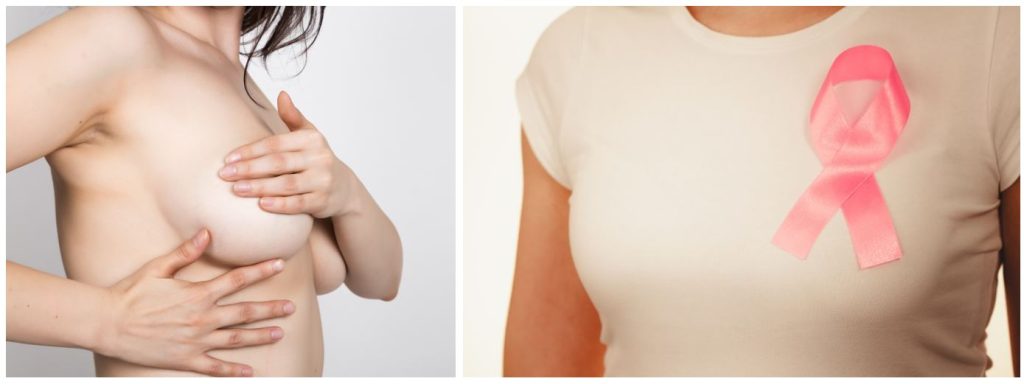Breast cancer is a malignant tumor of the mammary gland and is the most common cancer in women in Austria. One in eight women in Austria will develop breast cancer in the course of her life. In the last ten years, the number of new cases has not increased. Fortunately, the prognosis for breast cancer patients has improved in recent years. This is due to preventive programs, more precise examination techniques, and new therapies.
The average age at diagnosis is about 64 years, and women under the age of 35 very rarely develop the disease. In women over 70 years of age, cases of the disease are declining again. However, the younger a woman is at the time of initial diagnosis, the more aggressive the course of the disease usually is.
75% of all breast cancers occur in women without risk factors. The two most important risk factors are age (from the age of 35, the risk begins to increase) and family history (if someone in the family already has the disease, the risk is increased). Approximately 10% of breast cancer cases occur in families with a predisposition; this can involve the appearance of the so-called breast cancer genes BRCA1, BRCA2, as well as other rarer gene mutations. Other risk factors include early menarche (<around 11 years), late menopause (>around 54 years), nulliparity or late first pregnancy, use of oral contraceptives, hormone replacement therapy during menopause, excessive alcohol consumption, overweight, and lack of physical activity.
Early detection through prevention
Early detection is one of the most important factors in breast cancer. In Austria, since 2014, there has been a free breast cancer early detection program that invites women between the ages of 45 and 69 every 2 years for a mammogram (including ultrasound examination of the breasts and armpits) through written invitations. For this, one can simply use the e-card (without a referral) to visit a quality-certified radiology institute (a list of participating radiology facilities is available at www.frueh-erkennen.at), which performs mammograms as part of the Austrian early detection program. Women between 40 and 44 years old, as well as women over 70 years old, need to register for the early detection program beforehand and can then also undergo early detection mammography every two years.
If there is a medical reason (such as a self-detected lump, changes in the skin, nipple, or similar) or a family history of increased risk of breast cancer, then a mammogram can certainly be performed outside of the screening program. However, this requires a referral from a specialist in gynecology and gynecology or internal medicine.
Important self-examination!
In addition to mammography, breast self-examination (once a month self-examination of the breasts/armpits and once a year examination by a gynecologist) is an important factor in breast cancer early detection.

What to do if breast cancer is suspected?
In a small percentage of all preventive examinations, an abnormal finding finally appears. This usually means that further clarification is required by taking a tissue sample (a so-called biopsy). For this purpose, your radiology institute will recommend a cooperating hospital or a doctor (preferably a certified breast health center, a radiologist, or a specialist in gynecology and obstetrics) who specializes in this area.
Breast cancer diagnosis – what’s next?
If the suspected diagnosis is ultimately confirmed, the lives of those affected will be turned upside down from one day to the next. An infinite number of questions arise. Fear, uncertainty, shame and worry are sometimes the first thoughts.
Oftentimes, during the initial conversation with the treating physician (which could be a gynecologist, surgeon, or oncologist), due to the multitude of organizational matters (such as scheduling further examinations, planning, and providing information for a possible operation or Chemotherapy) there may not be enough time to discuss – equally important – interpersonal issues. Fear of uncertainty“What lies ahead for me?”, “What is the worst that could happen to me?”, “Will the treatment help me?”, “How will I tolerate the surgery/treatment?” Thoughts regarding “visible changes” such as hair loss, partial/total removal of the breast, or scars are just a few of the many concerns that women have at this moment.
My many years of experience with breast cancer patients show me every day that (almost) all women find themselves in an exceptional situation when they are diagnosed with breast cancer. Through an empathetic, competent conversation, many of the patient’s worries can be alleviated or, at best, taken away. The Austrian Cancer Aid has been offering free and anonymous consultations for patients, as well as their family members, for example, as part of the “Pink Ribbon” campaign for 15 years (www.pinkribbon.at, www.krebshilfe.net).
However, 90% of all breast cancers today are diagnosed at an early stage – and thus have a very good prognosis!In early-stage breast cancer, the tumor is confined to the breast and has not spread to the lymph vessels in the armpit or to the rest of the body; therefore, there are no metastases (secondary tumors) at the time of diagnosis. In addition to surgery for the tumour, the aim of the treatment is to prevent the cancer cells from spreading to the rest of the body. In order to achieve this goal, however, lengthy, stressful therapies are often required.
Regarding the operation, the goal is a procedure called “breast-conserving surgery” (where only the breast tumor is removed with a certain margin of safety), which is as “safe” as complete removal of the breast. After breast-conserving surgery, radiation therapy of the breast and potentially the armpit is almost always necessary.
Treatment options for early breast cancer
Anti-hormone therapy (colloquially often referred to as hormone therapy) has been the cornerstone of therapy for many years. However, a prerequisite for this is that the tumor is what is known as “hormone-sensitive breast cancer” (this is determined during the examination of the tissue sample and documented in the form of a histological report). Depending on menopausal status, different medications (mostly in tablet form, less commonly in the form of injections) are prescribed, which should be taken for a duration of five to ten years.
If the examination of the tissue sample reveals that it is an aggressive breast cancer, your doctor may recommend chemotherapy. Often, chemotherapy is administered before surgery, both to shrink the tumor and to prevent the spread of tumor cells to the rest of the body.
I see my role as an oncologist in accompanying you through the often very challenging times of treating your breast cancer and providing advice based on my years of professional expertise in case of uncertainties, complications, or any other issues related to your breast cancer diagnosis.

Dr. Verena Sagaster – Specialist in hematology and internal oncology in Vienna

